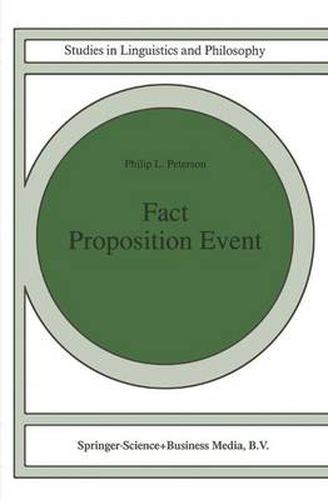Readings Newsletter
Become a Readings Member to make your shopping experience even easier.
Sign in or sign up for free!
You’re not far away from qualifying for FREE standard shipping within Australia
You’ve qualified for FREE standard shipping within Australia
The cart is loading…






This title is printed to order. This book may have been self-published. If so, we cannot guarantee the quality of the content. In the main most books will have gone through the editing process however some may not. We therefore suggest that you be aware of this before ordering this book. If in doubt check either the author or publisher’s details as we are unable to accept any returns unless they are faulty. Please contact us if you have any questions.
This study proceeds from a philosophical and linguistic industry that began in the 1960s with Vendler’s work on nominalization. Natural languages distinguish syntactically and semantically between various sorts of what might be called gerundive entities - events, processes, states of affairs, propositions, facts, all referred to by sentence nominals of various kinds. Philosophers have worried for millennia over the ontology of such things or things , but until 20 years ago they ignored all the useful linguistic evidence. Vendler not only began to straighten out the distinctions, but pursued more specific and more interesting questions such as that of what entities the causality relation relates (events? facts?), and that of the objects of knowledge and belief. But Vendler’s work was only a start and the author of this text has continued the task, both philosophically and linguistically. This book constitutes recent thought regarding gerundive entities, defended in detail. Peterson’s ontology features just facts, proposition, and events, carefully distinguished from each other. Among his more specific achievements are: a treatment of the linguist’s distinction between factive and nonfactive constructions; a detailed theory of the subjects and objects of causation, which impinges on action theory; an interesting argument that fact, proposition, events are innate ideas in humans; a theory of complex events (with implications for law and philosophy of law); and an overall picture of syntax and semantics of causal sentences and action sentences. Though Peterson does not pursue them here, there are clear and significant implications for the philosophy of science, in particular for our understanding of scientific causation, causal explanation and law likeness.
$9.00 standard shipping within Australia
FREE standard shipping within Australia for orders over $100.00
Express & International shipping calculated at checkout
This title is printed to order. This book may have been self-published. If so, we cannot guarantee the quality of the content. In the main most books will have gone through the editing process however some may not. We therefore suggest that you be aware of this before ordering this book. If in doubt check either the author or publisher’s details as we are unable to accept any returns unless they are faulty. Please contact us if you have any questions.
This study proceeds from a philosophical and linguistic industry that began in the 1960s with Vendler’s work on nominalization. Natural languages distinguish syntactically and semantically between various sorts of what might be called gerundive entities - events, processes, states of affairs, propositions, facts, all referred to by sentence nominals of various kinds. Philosophers have worried for millennia over the ontology of such things or things , but until 20 years ago they ignored all the useful linguistic evidence. Vendler not only began to straighten out the distinctions, but pursued more specific and more interesting questions such as that of what entities the causality relation relates (events? facts?), and that of the objects of knowledge and belief. But Vendler’s work was only a start and the author of this text has continued the task, both philosophically and linguistically. This book constitutes recent thought regarding gerundive entities, defended in detail. Peterson’s ontology features just facts, proposition, and events, carefully distinguished from each other. Among his more specific achievements are: a treatment of the linguist’s distinction between factive and nonfactive constructions; a detailed theory of the subjects and objects of causation, which impinges on action theory; an interesting argument that fact, proposition, events are innate ideas in humans; a theory of complex events (with implications for law and philosophy of law); and an overall picture of syntax and semantics of causal sentences and action sentences. Though Peterson does not pursue them here, there are clear and significant implications for the philosophy of science, in particular for our understanding of scientific causation, causal explanation and law likeness.